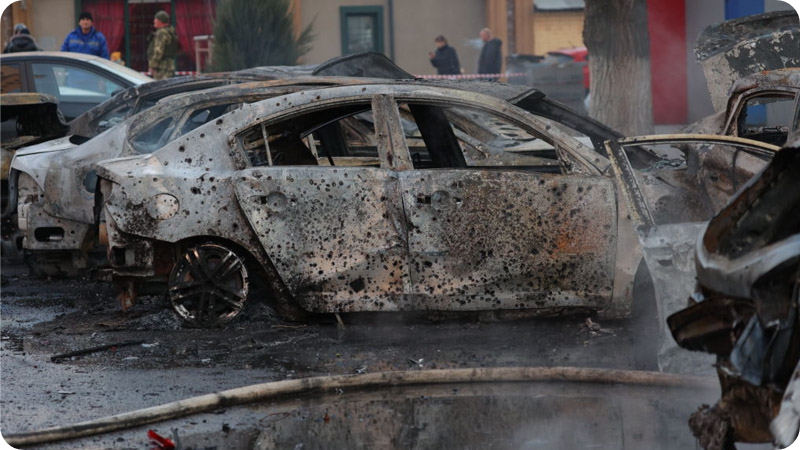
Belgorod Terror Bombing Signals Ukraine’s ‘Desperation’ – US Army Col. Earl Rasmussen
Keep up to Date & Bypass the Big Tech Censorship
Get uncensored news and updates, subscribe to our daily FREE newsletter!
Over a dozen civilians were killed and scores more injured during Saturday’s daytime Ukrainian missile strike on Belgorod – a Russian city of 340,000 situated about 40 km from the Ukrainian border. Sputnik asked retired US Army colonel Earl Rasmussen for his take on what the Ukrainian military’s terror bombing campaign is meant to accomplish.
Casualties from Saturday’s Belgorod terror bombing attack continue to mount, with the Emergency Situations Ministry reporting at least 14 dead and 108 injured as of 6:30 pm Moscow time.
Russia’s military vowed to respond to the “criminal” attack in a measured way without resorting to eye-for-an-eye deliberate targeting of civilians. Meanwhile, the Russian Foreign Ministry has announced plans to call a meeting of the United Nations Security Council to discuss the incident.
| Recommended Books [ see all ] | ||||
|---|---|---|---|---|
 |  |  |  |
 |
The MoD indicated that Saturday’s strikes involved two Vilkha long-range guided, cluster munition-equipped missiles and a number of Czech-made RM-70 Vampir MLRS rockets, donated by Prague to Kiev in 2022. Russian air defenses targeted by the incoming missiles and rockets, shooting some of them down and reportedly preventing the Vilkhas from scoring a direct hit which the MoD said would have made the strike’s deadliness “immeasurably more severe.”
“I think we see a sign of desperation in Ukraine,” Earl Rasmussen told Sputnik, commenting on the Belgorod attacks.
“They claim that they’re targeting military [objects], but we see very seldom [that it] is actually military targets. And in this case, we have a large number of civilian casualties. It’s desperation,” the former Eurasia Foundation vice president added.
“They’re trying to hit into Russia proper, they’re trying to change attitudes of Russian people perhaps. They’re trying to claim some type of ‘positive news’ they can provide their backers,” Rasmussen explained, not ruling out that the Belgorod strike may have been based on targeting information provided by NATO.
“It easily could have been Western countries providing targeting information. Did they provide them incorrectly? Were the coordinates off? I think they’re trying to strike out just at anything…That’s the situation with Kiev. I think they’re just trying to strike at anything and inflict whatever type of damage they can rather than rationally coming to a negotiated settlement or accepting the outcome. They’re in denial and delusion and they’re just trying to lash out. And it’s unfortunate civilians are being killed. It’s a pattern of theirs, and I think it’s a sign of desperation.”
Rasmussen stressed that if the logic of Saturday’s attack was to put “political pressure” on Russians or facilitate a change of policy by Moscow, the calculation was woefully mistaken. “I think these efforts will actually do the opposite, but I think those are some of the thought processes they may be having on the why,” he said.
In any case, the observer said Belgorod is a natural target for Kiev, since it’s situated just 40 km from the border, and is a fairly large city, meaning attacking it will be reported on heavily.
“Belgorod is big enough where you’re going to see it in the news, it’s going to be heightened awareness and so it kind of plays into their terror – it’s terrorism, that’s what it is. It’s basically terror tactics. And even though their political goals or their military goals are not being met, terror tactics are there to strike fear, to [prompt] questions, to disrupt society and the average person. And that’s what they’re doing. If we look at this whole campaign, we’ve seen a lot of terror-type tactics. Drones attacking Moscow, attacking the Kerch Bridge. We’ve seen the Nord Stream pipeline being blown up. We’ve seen other sites attacked. It’s basically international terrorism, and Ukraine is actively participating in that,” Rasmussen emphasized.
Saturday’s deadly Belgorod attack comes in the wake of the failure of Ukraine’s disastrous summer counteroffensive, which failed to expel Russia from Crimea, Kherson, Zaporozhye or the Donbass, and cost the country’s military over 125,000 casualties. It also came a day after a massive Russian air and drone strike campaign targeting energy facilities, ammunition depots, airfields, ports, fuel terminals and military headquarters using over 120 cruise and ballistic missiles and dozens of drones in Kiev, Karkhov, Dnepropetrovsk, Konotop, Lvov, Odessa and the Ukrainian-controlled portion of Zaporozhye.
Scott Bennet of https://globalfreedomtv.com/ joins The Alex Jones Show to report on what he witnessed in the Ukraine war zone.


